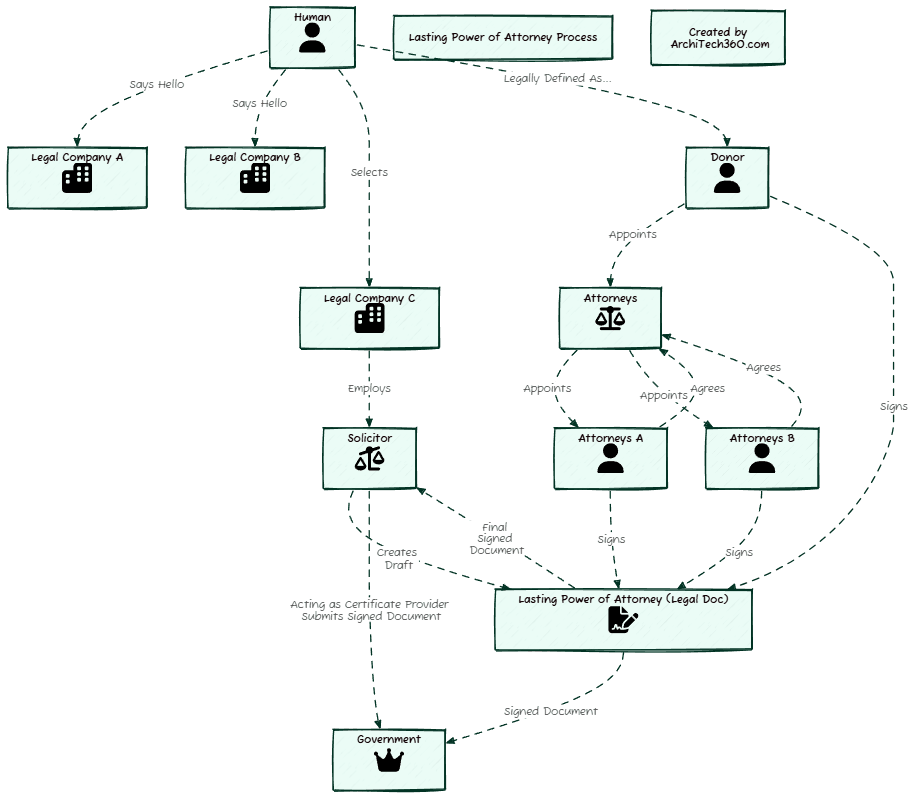Lasting Power of Attorney Reference Architecture
Easily understand how the Lasting Power of Attorney (LPA) process works
The Lasting Power of Attorney is a legal process and document that enables you to grant other people the power, legally speaking, to make decisions on your behalf. This is a common process within the UK, particularly in later life, when you will need others to support you as you start to lose your faculties either mentally or physically. Many people actually wait for much later in life to get these things in place, but there really is no need to wait, and if anything, it’s better to get these legal documents completed sooner rather than later. After all, you or anyone you know could easily get hit by a bus tomorrow.
There are two types of Lasting Power of Attorney documents within the UK;
1. Health and Welfare – Which allows your appointed Attorney(s) to make decisions about your care and medical treatment
2. Property and Financial Affairs – Which allows your appointed Attorney(s) to make decisions about your finances and property
It’s important to note here that the word Attorney in this context is (almost) anyone your choose to appoint, it could be your long term friendly neighbour or a family relation. It’s completely up to you.
While almost everyone will have to deal with this process at some point in their life, it’s not a very well understood process that people often just ignore until they are forced to do something about this. And waiting can result in complex hoops to jump through, at a point in time when you or your loved ones really don’t want to be dealing with it.
So here is a brief overview of the Lasting Power of Attorney process for a high level understanding;
- Generally the process is started by the person who is getting older and is well aware of what ultimately happens next
- They will get in touch with various companies to talk to them about this (you can now complete this process fully online, so this step isn’t a required step)
- Once they have selected the company they are working with…
- They will be appointed a point of contact in that company such as one of their in-house employees who is acting in a formal capacity such as a solicitor
- The solicitor will then be responsible for having conversations with you to understand your personal circumstances, situation and who you would like to be your Attorney(s) to deal with your affairs when you are no longer able to…
- Which will then enable them to create a Draft Power of Attorney legal document
- This then gets sent to you, so that you can speak with the people you have appointed as your Attorney(s) and get them to sign the paperwork after they have checked everything for accuracy.
- Once all of this is complete, the Solicitor then sends the paperwork to the Government (via the legal system) to formally register the Lasting Power of Attorney document so that everything can progress smoothly at the point in time when things kick in.
Some interesting facts to know about what actually happens with or without the Lasting Power of Attorney in place, as it’s a common mis-understanding that your Next of Kin can just handle everything, but the next of kin doesn’t have the legal right to make decisions.
Without a Lasting Power of Attorney in place;
1. Sole bank bank accounts are frozen
2. Joint bank accounts are frozen in some circumstances
3. Bills cannot be paid from your bank accounts
4. Investment decisions can’t be made and any previous authority given to make investment decisions is cancelled
5. Property cannot be sold, meaning if you have a co-habiting partner, they can’t move house if they wanted to
6. Next of Kin doesn’t have the legal right to make decisions about your medical treatments
7. Next of Kin doesn’t have the legal rights to make personal choices for you, such as where you should live
When compared to when you do have a Lasting Power of Attorney in place;
1. You have legally appointed representatives in place to make decisions about your finances
2. Your banks recognise your legally appointed representatives and can manage your finances and your accounts remain active
3. Investment decisions can be made by your legally appointed representatives
4. Bills can continue to be paid as normal
5. Property can be sold if needed
6. Your legally appointed representatives can make decisions about your medical treatment
7. Your legally appointed representatives can make personal decisions such as where you want to live

